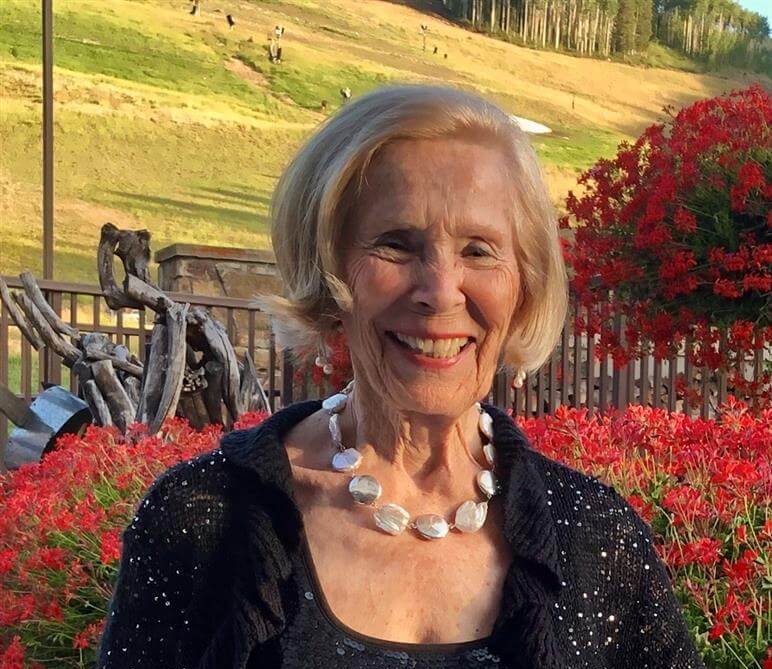Libby Bortz, a Rose Community Foundation Legacy Circle member and donor, was honored with induction into the Colorado Women’s Hall of Fame in 2022. Additionally, an assisted living center in Littleton bears her name. However, her impactful journey in philanthropy, advocacy, and advancing equity began in a small town in New York.
Libby grew up with the understanding that taking care of people was important – and that she had a responsibility to do so. “I watched my parents to do that,” says Libby. “They had a pharmacy in a small country town and there were several people who could not afford to pay for their prescriptions. I saw my parents say ‘okay, it’s our responsibility to help.’”
Following in the examples of her parents and other family members, Libby has spent her life making a difference for others through her work in counseling, criminal justice, housing affordability and advancing equity for women.
Libby moved to Littleton, Colorado following graduation from the University of Michigan with a bachelor’s degree in public health. Interested in a career in healthcare, Libby spoke with the dean of admissions at the University of Colorado Anschutz Medical Campus and inquired on how to submit a compelling application. At the age of 27, she was told she was too old.
“I decide to determine the percentage of women in medical school, and I discovered they only had a six percent quota,” says Libby. “It made me question why we were being excluded.”
Three years later, Libby initiated a successful lawsuit that increased opportunity and opened medical schools to women in Colorado. The effect of this legal victory extended beyond medical schools, prompting law schools and other institutions to also open their doors to more women.
Although these were major accomplishments, Libby’s work helping others was only beginning. She went on to earn her master’s degree in social work from the University of Denver and became a clinical social worker at a mental health center where two-thirds of her clients were women – many facing significant challenges, leading to depression and other mental health issues.
Through her work, Libby discovered that around 42 million American women lacked financial independence, a core issue underlying the challenges facing many of her clients. Collaborating with Arapahoe Community College, she established workshops tailored for divorced or separated women. These initiatives at the community college enabled women to pursue degrees and acquire new skills and a sense of independence—a source of immense pride for Libby.
“I was taught that it is crucial to do what you think is right and take care of those around you,” says Libby. “I saw my parents behave that way and I’m lucky to have had that kind of modeling.”
The values instilled in Libby motivated her not only to advocate for women’s rights but also to address the shortage of affordable housing in Littleton. “When I saw the limited availability of housing for moderate and lower-income individuals in our community, along with the lack of diversity, I decided that I wanted my kids to grow up in a heterogeneous environment, not a homogenous one,” says Libby.
Seeking to enhance accessibility in Littleton, Libby urged the city council to create a housing authority, a request that came to fruition in 1971. She served on the housing authority board for 47 years; in Libby’s words, once she starts something, she sticks with it to ensure its success.
“Many of the residents were single mothers attending Arapahoe Community College. Within a year, they were able to achieve independence and some financial stability, enabling them to transition out of affordable housing,” says Libby.
As a tribute to her efforts in advancing affordable housing in Littleton, the first assisted living center in the United States constructed by a public housing authority bears her name as the Libby Bortz Assisted Living Center.
Now, at the age of 89, Libby continues to uphold her responsibility of taking care of others and advancing equity through her philanthropy. In addition to being a member of the Foundation’s Legacy Circle, she also gives to the Foundation through a Qualified Charitable Distribution (QCD), which allows taxpayers aged 70 ½ and over to donate up to $105,000 from their individual retirement account (IRA) to a qualified charity. Libby appreciates the Foundation’s guidance around charitable giving that is also rooted in shared values.
“The more you stand up for your rights and continue to do the right thing, the more that can be achieved,” says Libby. “Rose Community Foundation has done the right thing ever since it was formed; I admire its commitment to a mission that resonates deeply with me.”
To learn more about Qualified Charitable Distributions or the Rose Community Legacy Circle, please contact Judy Altenberg, director of donor funds and legacy giving.

